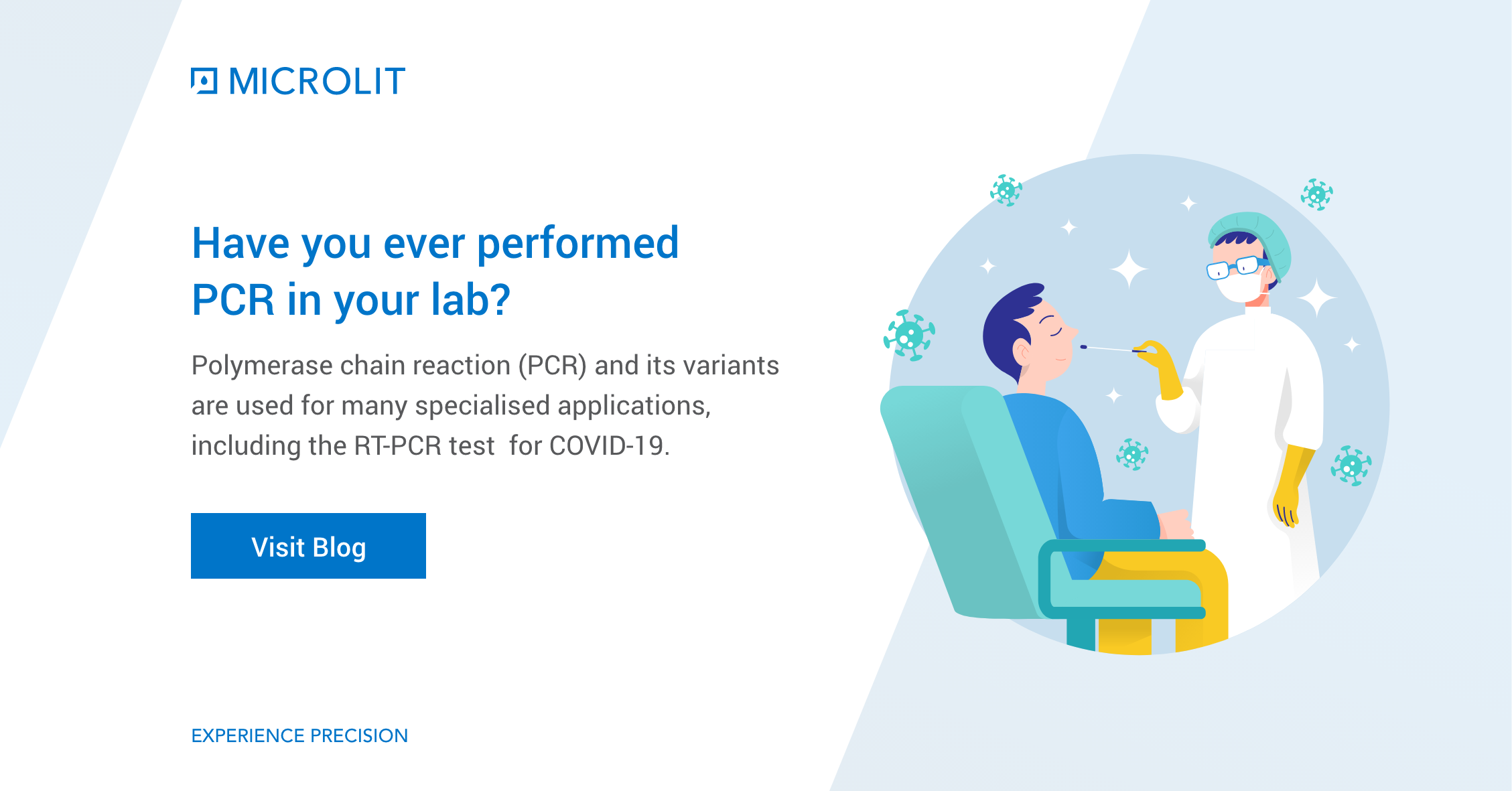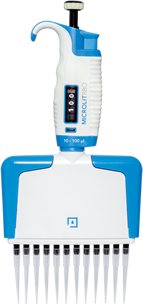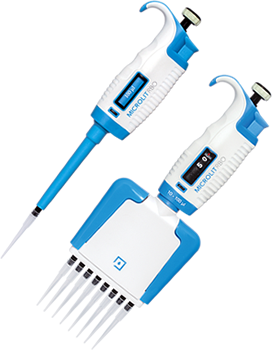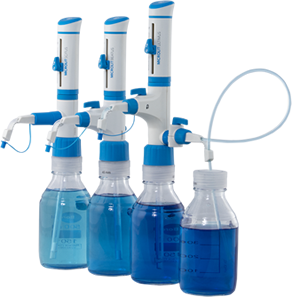As the world continues to cope with the COVID-19 pandemic, there are certain terms that scientists have been using repeatedly and have now become a part of our everyday vocabulary. The most widely used is the RT-PCR test.
PCR is actually a widely used, simple yet very useful procedure in molecular biology. First discovered in 1983, the PCR amplifies or makes millions of copies of a particular section of DNA sample so that it can be studied in detail. This is a valuable technique used for DNA fingerprinting, diagnosis of genetic disorder and other molecular and genetic analyses.
The entire process is carried out in a controlled environment within a laboratory in a machine called a thermocycler. The process involves a continuous change in temperature known as thermal cycling to allow DNA denaturing and synthesis. In this blog, we will be discussing the significance and the various applications of the Polymerase Chain Reaction (PCR).
RT-PCR – A Household Name in Recent Times
As the COVID-19 disease is spreading across the world, the real-time Reverse Transcription-Polymerase Chain Reaction (RT-PCR) test is playing a crucial role in its detection. The RT-PCR test is one of the fastest and the most accurate laboratory methods for detecting, tracking and studying the virus.
The PCR Process
The PCR test involves the following three steps. It might take a few hours or even less than an hour, with the help of a high-tech machine, to complete.
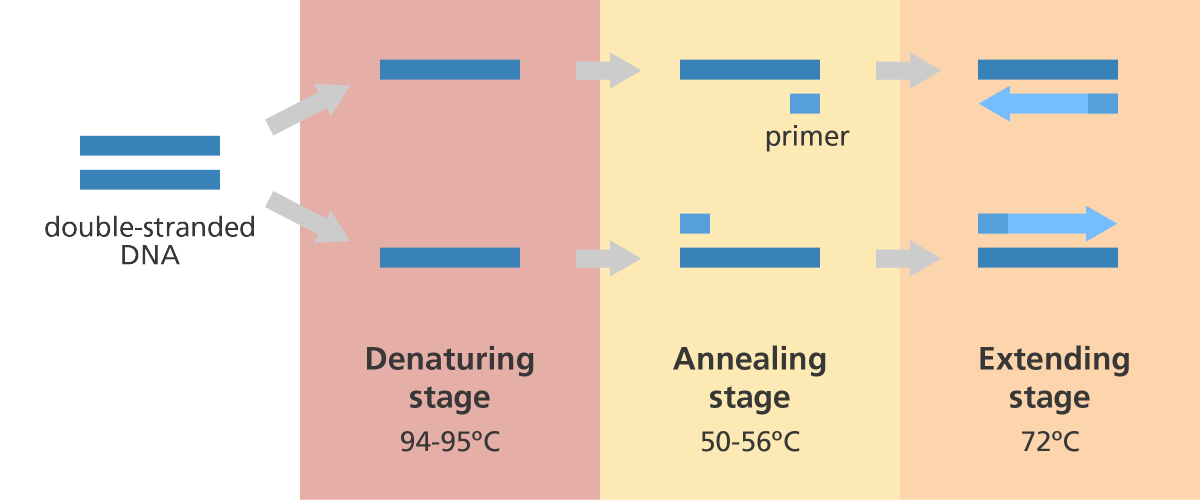
Image reference: https://www.yourgenome.org/
Steps involved in Polymerase Chain Reaction (PCR)
Step 1: Denaturation
The first step in the PCR test is to heat the double helix of the DNA to approximately 92°C. This high heat separates the 2 polynucleotide strands by breaking the hydrogen bonds of the DNA. This process is known as denaturation.
Step 2: Annealing
In the next step, the temperature is lowered to 50°C – 65°C. During this step, nucleotides and primers are added, and the primers bind to their targeted DNA sequences, initiating polymerisation.
Step 3: Extension
To achieve extension, the temperature of the reaction mixture is raised to 72°C. In this step, Taq DNA polymerase, an enzyme taken from the Thermus aquaticus, joins the free DNA nucleotides together. The end result that we get is two double-stranded DNA, one original and the other a newly made strand.
These 3 steps of thermal cycling are repeated 20-40 times to get a billion or more copies of the DNA. This process takes around 2-3 hours to complete.
Application of PCR
-
Diagnosis of Infectious Diseases
PCR, with its specificity, sensitivity and high speed of amplification has championed the identification of infectious diseases. It also allows the identification of non-cultivable or slow-growing microorganisms. The basis of this diagnostic is the detection of infectious bacteria or viruses. PCR helps in detecting diseases like human immunodeficiency virus (HIV), tuberculosis (TB).
-
Forensic Analysis
Genetic fingerprinting has seen widespread application in forensics. DNA profiling is used by forensic scientists for DNA typing, genetic fingerprinting, DNA testing, to identify someone based on their DNA. This technology is widely used by criminal investigators as it can identify one person from a million others.
-
DNA Cloning
A molecular biology technique, DNA cloning enables the lab researchers to make identical copies of a piece of DNA. In a typical cloning process, the fragment of interest is inserted into a larger genome, amplifying the DNA. With slight alterations to the PCR protocol, genes can be mutated.
Role of Liquid Handling Instruments in PCR
Though most of the PCR process is automated and easy-to-conduct, it is the setting up which is highly time-consuming. The PCR setup involves numerous pipetting steps that can act as a bottleneck and also increases the chances of human error as well as contamination.
Given the current conditions, for instance, the whole process and getting the correct results is crucial. During the setup, microlitre or even sub-microlitre volumes of a reagent are transferred, automatically increasing the chances of error resulting in inaccurate results.
Then there is speed. To carry out such a tedious task it is imperative that no step should be hurried. Therefore, the setup takes time. It will be highly beneficial if the speed of the process can be increased, helping in carrying out more tests at the same time.
To curb these challenges, the answer is automation.
Using sophisticated, automated liquid handling instruments during the setup of PCR will be highly beneficial for lab users. With a fully automated PCR, the certainty and reliability of the test will increase while saving time. Automation also means minimal human contact eliminating the chances of contamination and degradation of the sample.
The Microlit Micropipettes
Micropipettes are sophisticated, high precision instruments designed to accurately measure and transfer volumes in the microlitre range. One of the most widely used scientific instruments, micropipettes are widely trusted to be accurate and hassle-free. As discussed above, they are used during the sample preparation stage of a PCR process. The available variants cater to the requirements of the experiment to be conducted.
Single Channel Variable Volume
A high precision micropipette, available in unique volume ranges, prominently used for Molecular Biology, Microbiology, Immunology, Biochemistry, Genetics. Explore Microlit Single Channel Variable Volume Micropipettes.
Single Channel Fixed Volume
A high precision micropipette, available in 15 unique volumes, recommended for Clinical Diagnostics, Control Analysis. Explore Microlit Single Channel Fixed Volume Micropipettes.
Multichannel (8-Channel and 12-Channel)
High precision micropipettes, available in 6 unique volume ranges, recommended for ELISA (Diagnostic Test), Molecular Screening, Kinetic Studies, DNA Amplification. Explore Microlit Single Channel Variable Volume Micropipettes.
When it comes to accuracy and precision, Microlit has earned a reputation of being a company that ergonomically designs its products ensuring the customer gets what s/he needs. With our range of innovative liquid handling instruments, we focus on blending features and functionality that facilitate a remarkable user experience in the lab.
If you routinely conduct PCR and related tests in your lab, ensure greater precision and accuracy with Microlit Micropipettes and Filter Tips. Get in touch with us at info-us@microlit.com.






 24793
24793